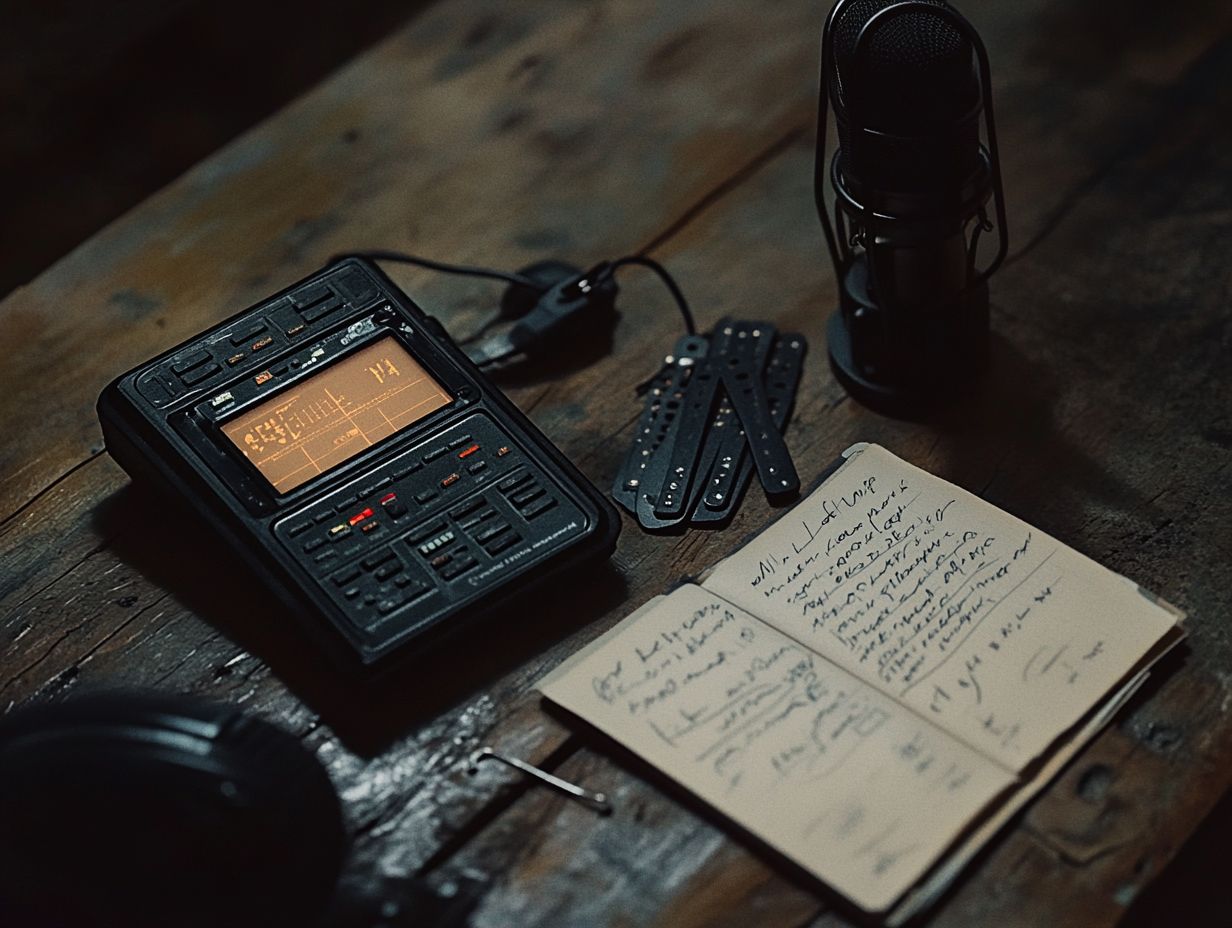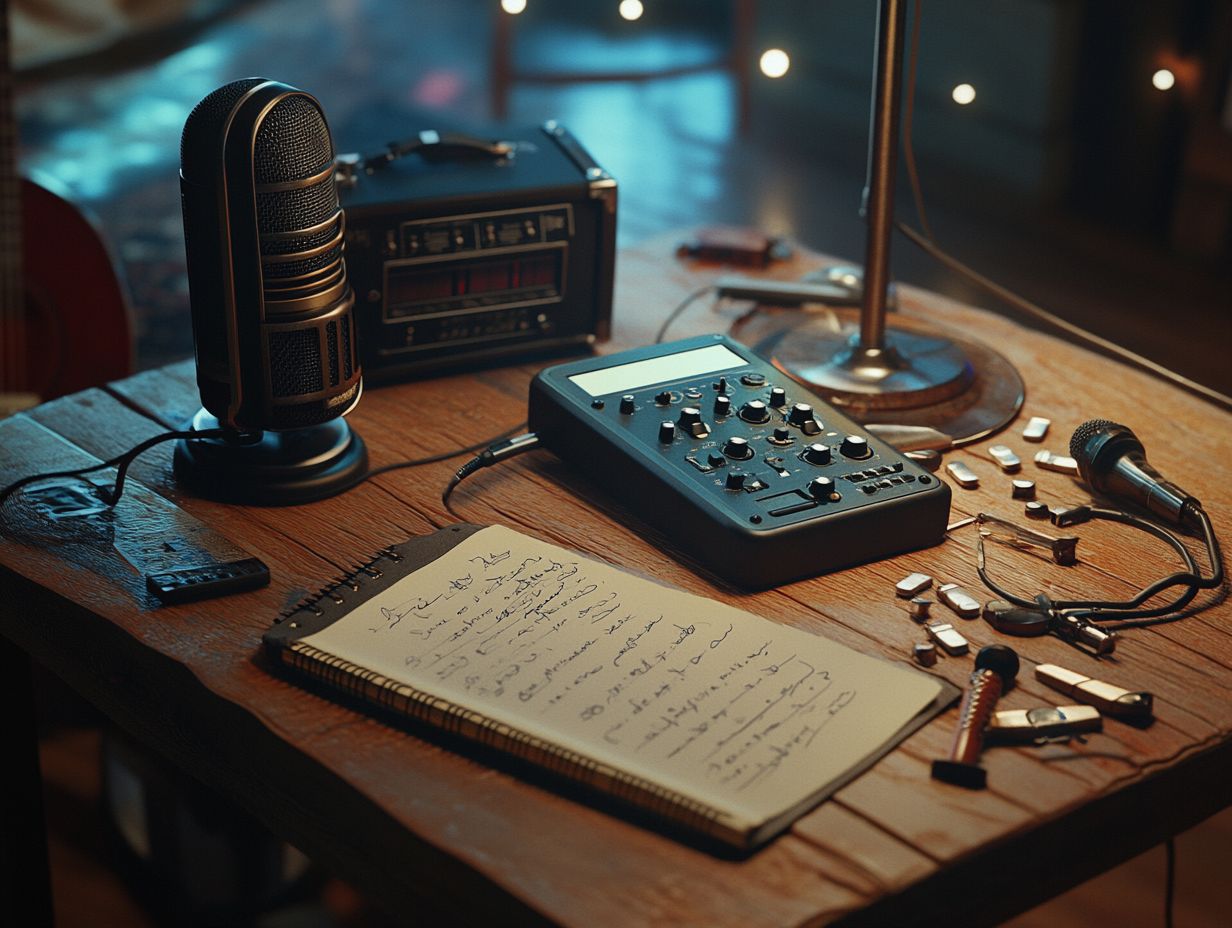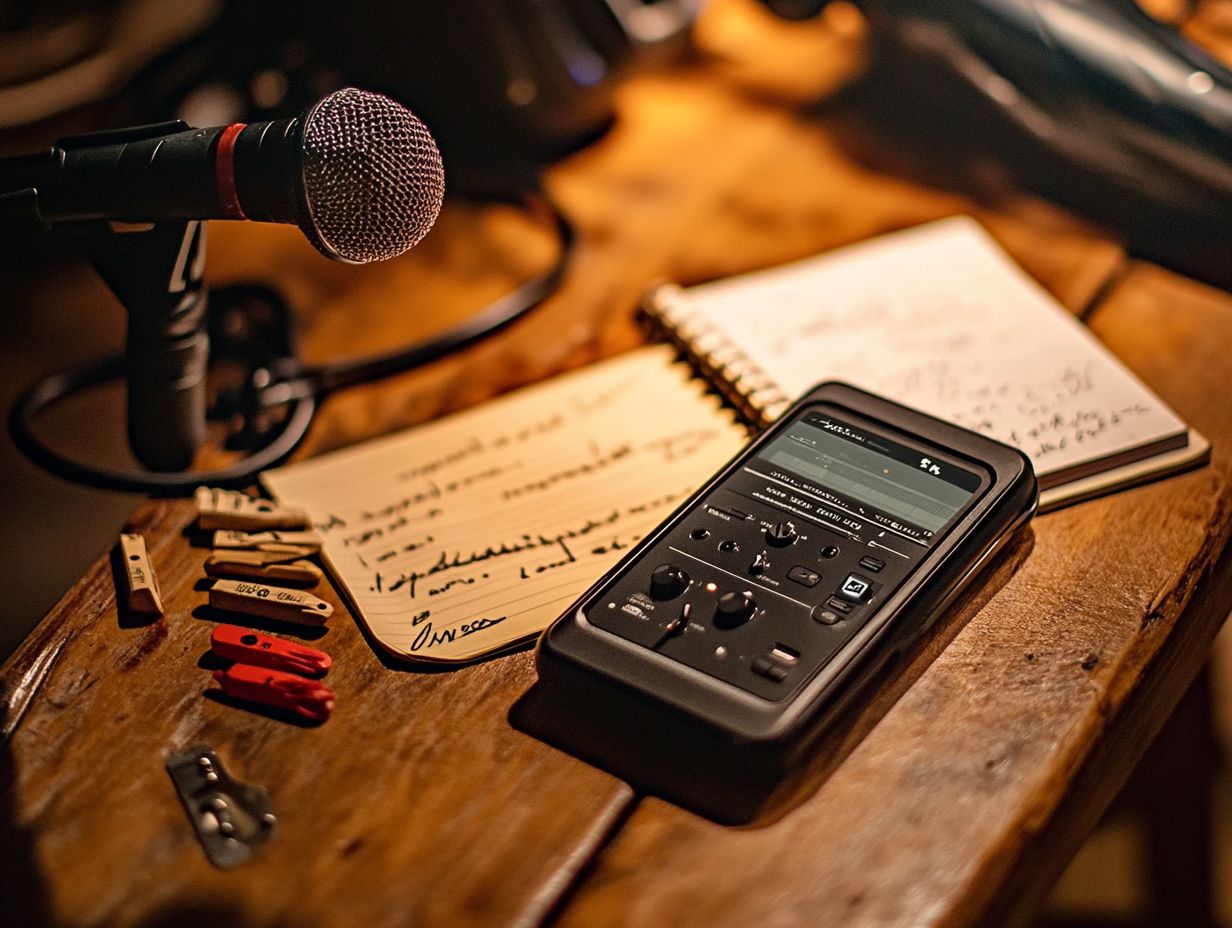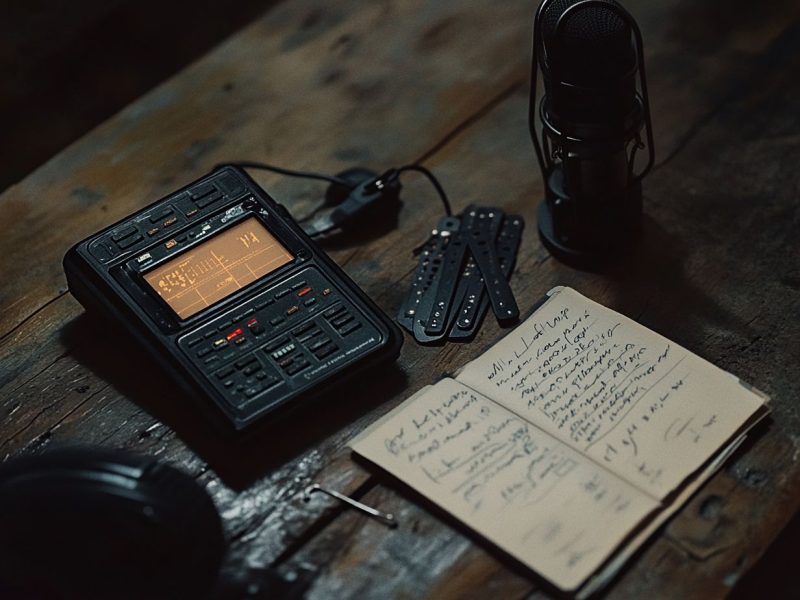In the contemporary music industry, the ability to capture high-quality sound while on the move is essential for musicians. Portable audio recorders present an ideal solution, offering superior sound quality and unmatched convenience for both practice sessions and live performances.
This guide examines the benefits of utilizing these versatile tools, outlines the key factors to consider when selecting the appropriate recorder, and highlights the top models available in the market. Additionally, it provides tips for optimizing recordings to enhance sound quality. Whether one is an amateur or a seasoned professional, this information will assist in maximizing the potential of portable audio recording technology.
What are Portable Audio Recorders?

Portable audio recorders are compact devices engineered for the purpose of capturing high-resolution audio across diverse environments, rendering them critical tools for musicians, sound engineers, and podcasters.
Their lightweight design, combined with advanced audio capabilities, facilitates ease of use and convenience, whether recording live performances or studio sessions.
Equipped with integrated built-in microphones and the ability to support external microphones, these devices guarantee that sound quality is maintained, even in challenging acoustic settings.
Moreover, the majority of contemporary portable recorders support a variety of file formats, including WAV and MP3, thereby offering users increased flexibility in their recording configurations.
Benefits of Using Portable Audio Recorders for Musicians
For musicians, portable audio recorders present numerous advantages that greatly enhance both the creative process and the final output. These devices deliver exceptional sound quality, enabling studio-quality recordings in various environments, whether in the field or during spontaneous jam sessions.
The compact design of these recorders facilitates easy transportation, a crucial benefit for artists who frequently travel. Furthermore, with features such as multi-track recording and audio editing capabilities, musicians can produce high-quality audio without the necessity of extensive equipment setups, thereby streamlining the music production process.
Improved Sound Quality
One of the most significant benefits of utilizing portable audio recorders is the superior sound quality they deliver, which is essential for any audio recording project. These devices, equipped with high-resolution audio capabilities, ensure that every note, nuance, and ambient sound is captured with exceptional fidelity.
Many models incorporate directional microphones and advanced audio preamps, which enhance sound dynamics and effectively isolate the intended audio source, resulting in recordings that are both clear and of professional quality. This level of sound quality is particularly vital for musicians and sound engineers who seek to achieve studio-quality results without relying on a traditional recording setup.
Along with offering various microphone types, such as condenser and dynamic options that are suited for different recording environments, portable audio recorders are often equipped with sophisticated audio processing features that significantly enhance the overall listening experience.
These tools employ sound isolation techniques to minimize background noise, thereby allowing users to focus on capturing authentic audio that accurately reflects the true essence of the sound source.
Furthermore, the integration of audio analysis capabilities enriches the recording process by enabling users to assess waveforms and frequency responses in real time. Whether capturing live performances, conducting interviews, or recording ambient sounds during fieldwork, these enhancements ensure that the recordings are not only of high quality but also serve as valuable resources for post-production editing and analysis.
Convenience and Versatility
The convenience and versatility of portable audio recorders render them essential tools for musicians and sound professionals, allowing for high-quality recordings in any location. Their compact design facilitates easy transportation, enabling users to capture audio during live performances, rehearsals, or in various environments.
With user-friendly interfaces that allow for prompt adjustments to recording settings, musicians can concentrate on their creative processes without the distraction of complex equipment. Many portable recorders incorporate features that support a range of recording techniques, thereby enhancing their functionality in diverse audio capture scenarios.
For example, individuals seeking to record interviews or meetings will find the lightweight design and extended battery life of these devices particularly beneficial, ensuring that they do not miss any critical moments.
Additionally, the option for USB connectivity allows for seamless file transfers to computers for editing or sharing, thereby streamlining workflow processes. Compatibility with audio interfaces and recording applications further enables sound professionals to expand their setups, integrating additional microphones or instruments as required.
Accessories such as windshields and carrying cases enhance the overall experience, facilitating the creation of high-quality recordings in both crowded venues and quiet studio settings.
Factors to Consider When Choosing a Portable Audio Recorder
When selecting a portable audio recorder, it is essential to consider several critical factors to ensure that the device aligns with your specific audio recording requirements.
The first factor to evaluate is sound quality, as various models provide differing capabilities regarding audio fidelity and the types of microphones included.
Furthermore, it is important to assess the available recording modes, such as multi-track recording or stereo recording, as these options can significantly influence your workflow and the final audio output.
Other vital considerations include battery life, supported file formats, and the overall durability of the recorder, particularly if it is intended for use in rugged or challenging environments.
Types of Recorders

A variety of portable audio recorders are currently available on the market, each specifically designed to address distinct recording needs and preferences.
Handheld recorders are particularly favored for their compact size and user-friendly operation, making them suitable for field recording and capturing ambient sound. In contrast, digital recorders often feature advanced capabilities that appeal to sound engineers in pursuit of professional-grade audio quality and editing options. Mini recording devices have also emerged as versatile solutions for casual users and podcasters, who prioritize portability without compromising essential recording functionalities.
Among the extensive selection available, stereo recorders stand out in musical applications, offering rich sound capture for concerts and rehearsals. For journalists, the advantages of utilizing compact digital models with dependable battery life and support for external microphones are significant, ensuring that interviews are recorded with clarity and precision. Additionally, some innovative models incorporate Bluetooth capabilities, facilitating seamless audio file transfer to smartphones or computers.
Ultimately, the appropriate choice of portable audio recorder depends on the specific needs of the user, whether for professional endeavors, personal projects, or casual enjoyment.
Features to Look for
When selecting a portable audio recorder, it is imperative to consider key features that enhance the overall recording experience and usability. One should seek models equipped with an intuitive user interface that facilitates easy navigation through recording settings and adjustments.
An LCD display is particularly advantageous for monitoring audio levels and effectively managing recording time. Additionally, connectivity options, such as USB ports for file transfer and compatibility with external microphones, can significantly augment the functionality of the recorder, making it an invaluable tool for both music production and podcasting.
The presence of high-quality audio preamps is essential, as they improve sound clarity by amplifying the microphone input without introducing unwanted noise. Furthermore, effective noise management features, including low-cut filters and dynamic range compression, are crucial in ensuring clean audio playback, particularly in challenging environments.
When assessing transportation controls, it is important to consider options such as durable cases and lightweight designs, which facilitate ease of transport. These features can profoundly influence the user’s recording techniques, ensuring that whether in a studio setting or out in the field, they can capture high-fidelity audio with both convenience and reliability.
Top Portable Audio Recorders for Musicians
Musicians seeking optimal tools to enhance their recording process will find several portable audio recorders that excel in audio quality, features, and usability.
These premier models deliver exceptional sound capture capabilities, making them suitable for a range of applications, from studio recordings to live performances.
Each device is characterized by distinct specifications and functionalities that cater to diverse recording styles, ensuring that musicians can identify a recorder that aligns seamlessly with their individual requirements.
Product 1
The first recommended portable audio recorder is Product 1, which is widely recognized for its exceptional sound quality and user-friendly interface. This device is equipped with advanced audio preamps, ensuring that recordings maintain high fidelity, even in complex acoustic environments.
Product 1 supports multiple file formats, including WAV and MP3, offering versatility for various recording applications such as music production and podcasting.
Users have consistently praised its compact design, making it an ideal choice for on-the-go recording scenarios without compromising quality. The inclusion of a built-in limiter and low-cut filter enhances its functionality by effectively minimizing unwanted noise interference during recordings.
Numerous reviews emphasize the robustness of the battery life, which facilitates extended recording sessions without concern for interruptions. Many users appreciate the intuitive menu navigation, which makes the device accessible for both beginners and experienced audio professionals.
Testimonials frequently highlight the ease of connecting directly to instruments or microphones, further broadening its appeal among musicians and content creators, thereby establishing it as a valuable tool in the field of audio engineering.
Product 2
Product 2 represents an excellent option for musicians in search of a portable audio recorder that effectively combines a compact design with impressive audio features. This model is particularly recognized for its extended battery life, facilitating prolonged recording sessions without the need for frequent recharging. Product 2 provides superior connectivity options, ensuring compatibility with a variety of external microphones and other recording accessories.
Along with these commendable attributes, musicians will value its sound fidelity, which guarantees pristine audio capture across various recording environments, whether in a studio setting or on location. The intuitive interface further enhances usability, allowing for swift adjustments even during live sessions.
However, potential drawbacks include its limited onboard storage compared to larger models and the requirement to purchase additional accessories for optimal functionality. Nevertheless, Product 2 remains a versatile tool for artists seeking to enhance their recording capabilities while maintaining ease of portability.
Product 3

Product 3 is highly esteemed for its ability to capture intricate sound dynamics, rendering it ideal for both studio recordings and field testing. This portable audio recorder offers a variety of recording modes that accommodate diverse audio capture requirements, whether for live performances or private sessions.
With its robust construction and professional audio capabilities, Product 3 is specifically designed to endure demanding recording environments.
The recorder’s impressive range of directional microphones ensures that sound configuration can be tailored to the recording context, facilitating clear isolation of the desired audio source. Users commend its intuitive interface, which streamlines the process of adjusting settings in real-time, whether in a bustling concert hall or a quiet studio setting.
Although its performance is exemplary in most scenarios, some users may find its battery life to be a limitation during extended recording sessions. Nonetheless, Product 3 remains a versatile choice for musicians, podcasters, and sound engineers who seek reliable audio quality.
Tips for Using Portable Audio Recorders Effectively
To maximize the potential of portable audio recorders, it is essential to adopt effective recording techniques and practices that enhance audio quality.
One should begin by familiarizing themselves with the device’s user-friendly interface and the available recording settings, which facilitates swift adjustments during recording sessions.
Additionally, it is important to consider the acoustic environment, as proper positioning and noise management can significantly influence sound fidelity.
Best Practices for Recording
Employing best practices in recording techniques is essential for achieving high-quality audio captures with portable audio recorders. It is important to begin by setting appropriate audio levels to prevent distortion and ensure clear sound capture during recording sessions.
Real-time monitoring through headphones enables the detection of potential issues, such as background noise or audio feedback, before they escalate into significant problems.
Strategically positioning the microphone can greatly influence the sound dynamics of the recording. Ideally, placing the microphone closer to the sound source minimizes ambient noise and captures clearer audio.
Additionally, considering environmental factors such as wind, humidity, and the acoustics of the recording space is crucial for overall sound quality. Utilizing windshields in outdoor settings and recording in acoustically treated rooms indoors can significantly enhance the clarity and depth of audio recordings.
A comprehensive understanding of these elements is fundamental for anyone dedicated to the professional audio landscape.
Editing and Post-Production Tips
Upon completing your recordings, effective audio editing during the post-production phase is essential for refining your audio and ensuring it aligns with your desired quality standards. It is advisable to utilize compatible software or recording applications that provide comprehensive audio editing capabilities, enabling you to clean up recordings, adjust audio levels, and apply noise reduction techniques as necessary.
Attention to sound configuration and dynamics is critical in achieving a polished final product.
This meticulous process encompasses several key steps, starting with:
- Trimming unwanted segments to enhance clarity and conciseness.
- Mixing to balance various audio elements, such as dialogue, music, and effects, ensuring they complement rather than overpower one another.
- Mastering to enhance the overall sound quality and prepare the track for distribution.
To optimize workflow, familiarizing oneself with software tools that offer audio analysis features is recommended, as they facilitate precise adjustments and provide insights into frequency ranges. Implementing professional audio techniques not only elevates the quality of the recording but also contributes to a captivating listening experience for your audience.
Frequently Asked Questions
What are portable audio recorders for musicians?

Portable audio recorders for musicians are small, handheld devices designed for recording high-quality audio on the go. They are commonly used by musicians and audio professionals to capture live performances, rehearsals, and songwriting sessions.
What are the benefits of using a portable audio recorder for musicians?
Portable audio recorders offer convenience, versatility, and high-quality sound. They allow musicians to capture audio anywhere, without the need for bulky equipment or complicated setups. They also offer a wide range of features such as built-in microphones, multiple recording formats, and long battery life.
What types of portable audio recorders are available for musicians?
There are various types of portable audio recorders available for musicians, including handheld recorders, pocket recorders, and multitrack recorders. Handheld recorders are the most commonly used and typically have built-in microphones, while pocket recorders are smaller and more compact. Multitrack recorders offer advanced features and the ability to record multiple channels simultaneously.
How do I choose the right portable audio recorder for my needs?
When choosing a portable audio recorder for musicians, consider factors such as recording quality, features, and budget. Think about your recording needs and the type of music you will be recording. It’s also important to read reviews and compare different models to find the best fit for you.
Can I use a portable audio recorder for professional recordings?
Yes, portable audio recorders can be used for professional recordings. Many models offer high-quality sound and advanced features that rival traditional studio equipment. However, it’s important to carefully choose the right recorder and use proper recording techniques to achieve professional results.
Are there any additional accessories I should consider purchasing for my portable audio recorder?
It depends on your specific needs, but some useful accessories for portable audio recorders include external microphones, wind protection, and carrying cases. These can enhance the quality and convenience of your recordings.


 Unlocking the Differences: Mixing Console vs Audio Interface Explained
Unlocking the Differences: Mixing Console vs Audio Interface Explained